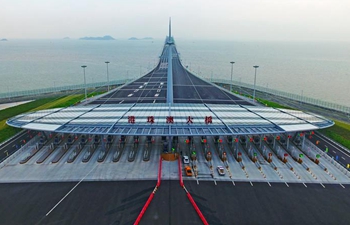
British Chancellor of the Exchequer Philip Hammond (C) stands outside 11 Downing Street with his staff ahead of presenting the third budget in London, Britain, on Oct. 29, 2018. Philip Hammond delivered his third budget and the final one before the planned date of Brexit with a promise to carry out the policies revealed regardless of whether there is a Brexit agreement. (Xinhua/Stephen Chung)
LONDON, Oct. 29 (Xinhua) -- British Chancellor of the Exchequer Philip Hammond delivered his third budget and the final one before the planned date of Brexit with a promise to carry out the policies revealed regardless of whether there is a Brexit agreement.
British Prime Minister Theresa May moved quickly on Monday morning to counter the policy view expressed by Hammond in a television interview on Sunday that a no-deal Brexit might mean a change in economic policy.
Hammond had implied that the growth measures which had already been built into his budget might have to be revisited, should there be a Brexit from the European Union (EU) with no agreement over trade and tariffs.
On Monday afternoon, Hammond backed his prime minister, and revealed to Members of Parliament in the House of Commons that the policy of austerity in government spending which began in 2010 as a response to the debts incurred tackling the financial crisis is now nearly over.
Hammond said: "The era of austerity is coming to an end."
He said that government borrowing to make-up the shortfall between its policy costs and its income will fall to 1.4 percent of spending in the next fiscal year 2019/20 and to 0.8 percent in 2023/24.
Hammond added that for Brexit he had already allocated 2.2 billion pounds (2.82 billion U.S. dollars) to government departments for Brexit preparations, and he added a further 500 million pounds to that amount.
He announced expected GDP growth figures over the next five years, which are now somewhat lower than the historic averages of about 2-2.5 percent because of continued poor productivity improvements in the British economy.
These figures are an improvement on the set of figures for the same period announced by Hammond in his last fiscal statement in March.
The upgraded growth forecasts are 2019, 1.6 percent (1.3 percent forecast in March); 2020, 1.4 percent (1.3 percent); 2021 and 2022 unchanged at 1.4 percent and 1.5 percent respectively, and a new forecast for 2023 of 1.6 percent.
To improve productivity, Hammond announced 1.6 billion pounds in new investments for an industrial strategy, and 150 million pounds for fellowships to employ talented overseas workers.
Unemployment figures, currently at a low of 4 percent not seen for more than 40 years, are forecast to fall further to 3.7 percent, while employment figures, already near a record high, are anticipated to rise from the current 32.4 million to 33.2 million by the end of 2023.
Government borrowing was forecast to be 11.6 billion pounds lower this financial year than had been forecast at the March statement and was set to fall from 31.8 billion pounds in 2019/20 to 26.7 billion pounds in 2020/21 and to 19.8 billion pounds in 2023/24.
A heavily-trailed commitment to increase spending on the National Health Service (NHS) will include a 10-year plan for a new NHS crisis service, Hammond said. This total extra spending on the NHS across Britain was labelled as a 25 billion-pound real terms increase in spending over the length of this parliament.
Hammond also announced extra money for municipal councils, which have born heavy cuts in the era of austerity, and an extra 560 million pounds will be given to councils this financial year to help fund social care obligations.
The chancellor of the exchequer also committed to delivering a new turnover tax on digital services, targeting giants such as Facebook, Google and other social media platforms, internet marketplaces and search engines.
Military spending was cut in real terms at the beginning of the austerity era, and Hammond announced a 1 billion increase in spending for this fiscal year above spending measures previously set out.
An extra 160 million pounds will be spent on counter-terrorism funding in this fiscal year, said Hammond, an announcement which comes just after the government announced it will move responsibility for countering far-right, homegrown terrorism from the police to the internal security service, MI5. (1 pound = 1.28 U.S. dollars)










